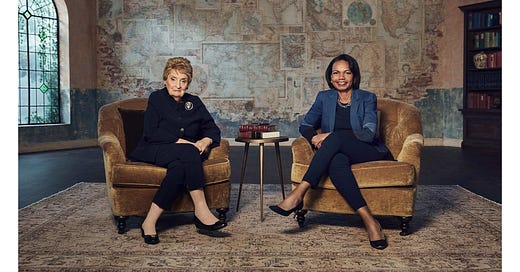Masterclass review: Madeleine Albright & Condoleezza Rice Teach Diplomacy
International relations was a potential subject of study for me in college. I had thought about becoming a translator for the UN. I love to travel. I am good at foreign languages. I enjoy learning about customs and cultures. Though I ended up veering towards something else as my major, I never lost my curiosity as to what international relations actually entailed.
So this Masterclass piqued my interest. For the most part, nothing they said was a surprise, but there was an overarching theme from the very beginning that stood out to me:
“Not everything has to be a zero-sum game. It has to be a win-win.” - Former Secretary of State Madeleine Albright
I have always thought that I was a good peacemaker. I thought that I did well at compromising, always tried to see both sides of the coin, was more interested in doing what was ultimately right than just doing things my way. I still do value those traits in myself, but I realized while watching this Masterclass that my interpretation of diplomacy was a little bit skewed:
I sacrificed far too easily.
I believed that if the other party was doing well, it meant that I was doing well.
I didn’t fight for my interests.
I thought that if I complied, then perhaps the other party would return the favor.
After thinking about it some more,
I realized that compromises made me uncomfortable.
They made me feel bad and guilty. They made me SQUIRM. I was far more comfortable sacrificing what I wanted, because I grew up without the ability to compromise. I grew up not really having seen it in my own family, certainly not around big and important things. It was my mother’s way or the highway.
As a result, finding and working towards a win-win outcome is not something that comes naturally to me in my interpersonal relationships.
“We’ve learned the hard way that actually, our fate, our prosperity, our security IS dependent on how well others are doing, too.” - Former Secretary of State Condoleezza Rice
This is the ultimate statement of the understanding that a relationship is a delicate ecosystem, whether it be between two countries or two individuals. Each party brings balance and value and needs. When one party is suffering, it affects the entire ecosystem. We see this in biology and in nature all the time.
In an abusive relationship, almost everything is a zero-sum game. If they get what they want, you have often lost something that you wanted. If you get what you want, you still lose because there is often a price to pay. If I gently declined to have sex one evening, I was told that I would have to have sex with him twice the next day. Everything revolves around the abuser and their needs: if they get what they want, then there is “peace” … until there is not.
You are essentially in a relationship with a terrorist.
WHERE YOU CAN FIND ME:
CURRENTLY:
Reading: “The Body Keeps The Score” by Bessel Van Der Kolk
Listening: “Reputation” by Taylor Swift




